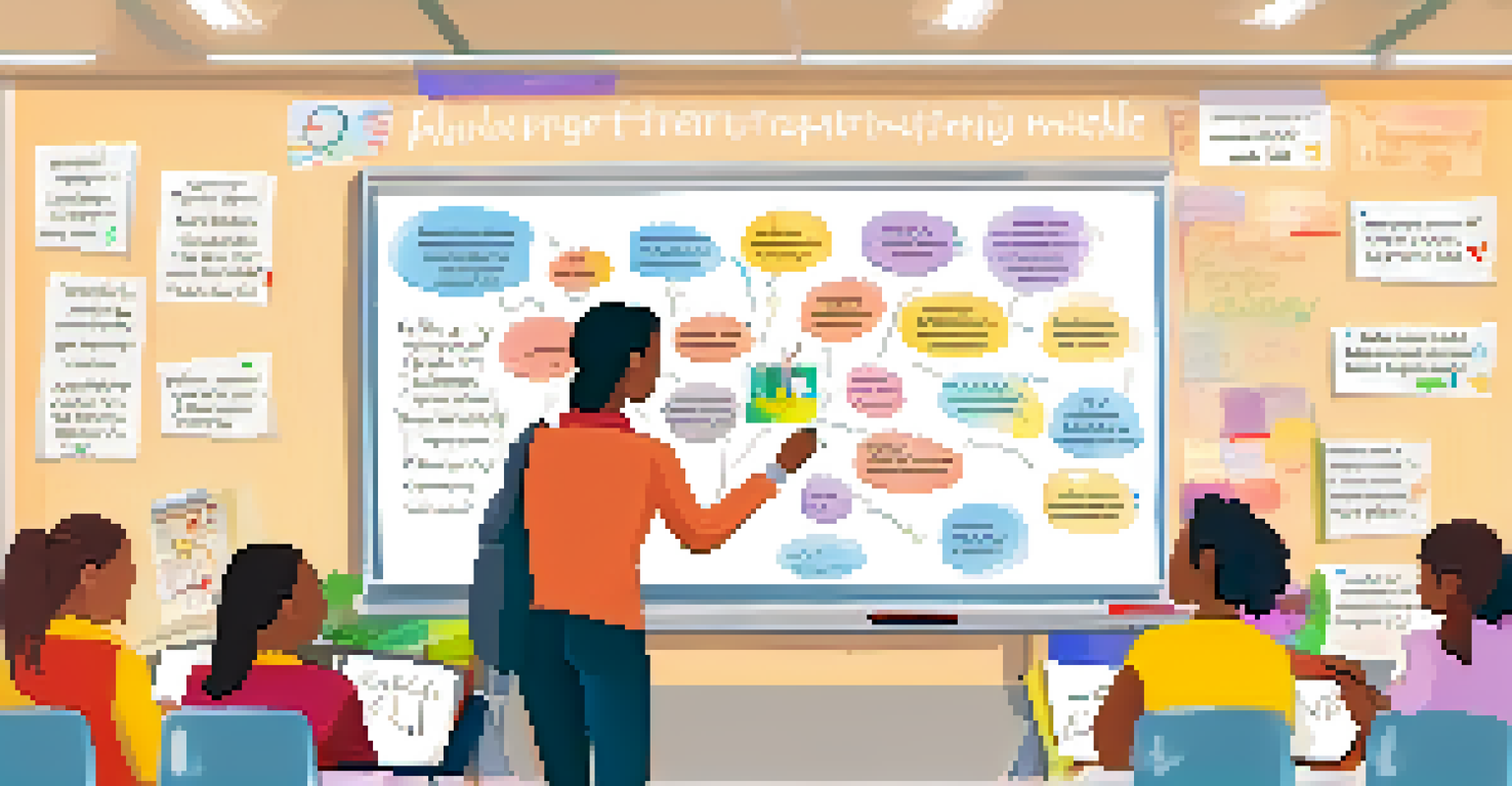Emotional Intelligence: Building Better Teacher-Student Bonds

Understanding Emotional Intelligence in Education
Emotional intelligence (EI) refers to the ability to recognize, understand, and manage our own emotions and the emotions of others. In education, this skill is crucial for fostering a positive learning environment. Teachers with high emotional intelligence can create a classroom atmosphere that encourages open communication and trust.
Emotional intelligence is the key to both personal and professional success.
By understanding their own emotional responses, educators can better connect with their students. For instance, a teacher who recognizes when they're feeling frustrated can take a moment to regroup instead of projecting that frustration onto their class. This self-awareness not only benefits the teacher but also models emotional regulation for students.
Moreover, when teachers can empathize with their students’ feelings, they can respond more effectively to various situations. For example, a student struggling with personal issues may not be as engaged in class, and an emotionally intelligent teacher can provide the necessary support and flexibility, fostering a stronger bond.
The Role of Empathy in Teacher-Student Relationships
Empathy, a key component of emotional intelligence, plays a vital role in building trust between teachers and students. When educators demonstrate understanding and compassion, students feel valued and heard. This connection can significantly enhance student engagement and motivation.

For instance, a teacher who takes the time to listen to a student’s concerns about their workload shows that they care about their well-being. This small act can transform a student's perception of school and learning, making them more willing to participate and share their thoughts in the classroom.
Emotional Intelligence Enhances Learning
Teachers with high emotional intelligence create supportive environments that improve student engagement and trust.
Additionally, fostering empathy can help prevent and address conflicts. When teachers approach disagreements with an empathetic mindset, they can mediate effectively, ensuring that students feel supported and respected. This creates a safe environment where students are more likely to express themselves honestly.
Developing Emotional Intelligence Skills as a Teacher
Teachers can enhance their emotional intelligence through training and practice. Workshops focused on communication skills, active listening, and conflict resolution can provide educators with valuable tools. By participating in these programs, teachers can learn how to respond to emotional cues from their students more effectively.
The greatest gift of a teacher is to be able to reach the hearts and souls of students.
Another effective method is reflection. Teachers can keep a journal to note their emotional responses during interactions with students. By analyzing these situations later, they can identify patterns and areas for improvement, ultimately leading to better emotional management in the classroom.
Moreover, peer collaboration can be instrumental in developing emotional intelligence. By observing and discussing each other’s teaching styles and emotional responses, teachers can share insights and strategies, creating a supportive community that prioritizes emotional growth.
Creating a Supportive Classroom Environment
A supportive classroom environment is essential for fostering emotional intelligence. By establishing clear expectations and promoting respect, teachers can create a space where students feel safe to express themselves. This environment encourages open dialogue and emotional sharing among all participants.
Incorporating activities such as group discussions or team-building exercises can further enhance this sense of community. When students collaborate and share their feelings during these activities, they learn to understand and appreciate diverse perspectives, strengthening their emotional intelligence.
Empathy Strengthens Teacher-Student Bonds
Demonstrating empathy helps teachers build stronger relationships with students, leading to better communication and conflict resolution.
Additionally, teachers can implement mindfulness practices into their daily routines. Simple exercises like breathing techniques or gratitude journaling can help students manage their emotions and enhance their focus, leading to a more harmonious classroom atmosphere.
Recognizing the Impact of Teacher-Student Bonds
The bonds between teachers and students can significantly influence academic performance and personal development. Research shows that strong relationships lead to higher student engagement, better grades, and increased motivation. When students feel connected to their teachers, they are more likely to take risks and participate actively in their learning.
Moreover, these relationships help students develop essential life skills. By observing their teachers' emotional intelligence in action, students learn how to handle their own emotions and interact positively with others. This skillset is invaluable, as it prepares them for future challenges both inside and outside the classroom.
Ultimately, nurturing these connections creates a ripple effect. As students develop their emotional intelligence, they are likely to apply these skills in their interactions with peers, family, and the broader community, contributing to a more empathetic society.
Overcoming Challenges in Building Emotional Connections
Building emotional connections in the classroom is not without its challenges. Various factors, such as large class sizes or diverse student needs, can make it difficult for teachers to establish individual relationships. However, with intentional strategies, these obstacles can be navigated effectively.
For example, utilizing technology can help teachers stay connected with students. Platforms for communication outside of class can allow students to express their feelings and thoughts in a more comfortable setting. This approach can bridge the gap for those who may struggle to engage in person.
Skills for Lifelong Success
Developing emotional intelligence in students prepares them for future challenges in both personal and professional settings.
Additionally, recognizing and addressing biases can enhance emotional connections. Teachers who are aware of their preconceptions can work towards creating an inclusive environment where every student feels represented and valued. This awareness fosters stronger relationships and promotes emotional growth for all students.
Long-term Benefits of Emotional Intelligence in Education
The long-term benefits of emotional intelligence in education extend beyond the classroom. Students who develop strong emotional skills are better equipped to handle stress and navigate relationships throughout their lives. This foundation can lead to greater success in both personal and professional realms.
In the workplace, individuals with high emotional intelligence are often seen as leaders and team players. They excel in collaboration, conflict resolution, and adaptability—skills that are increasingly valued in today's dynamic job market. This makes fostering emotional intelligence in schools not just beneficial but essential for future success.

Furthermore, as these emotionally intelligent individuals grow into adulthood, they contribute positively to society. Their ability to empathize and connect with others can lead to healthier communities, reduced conflicts, and a greater sense of solidarity. Ultimately, investing in emotional intelligence in education yields profound benefits for individuals and society as a whole.